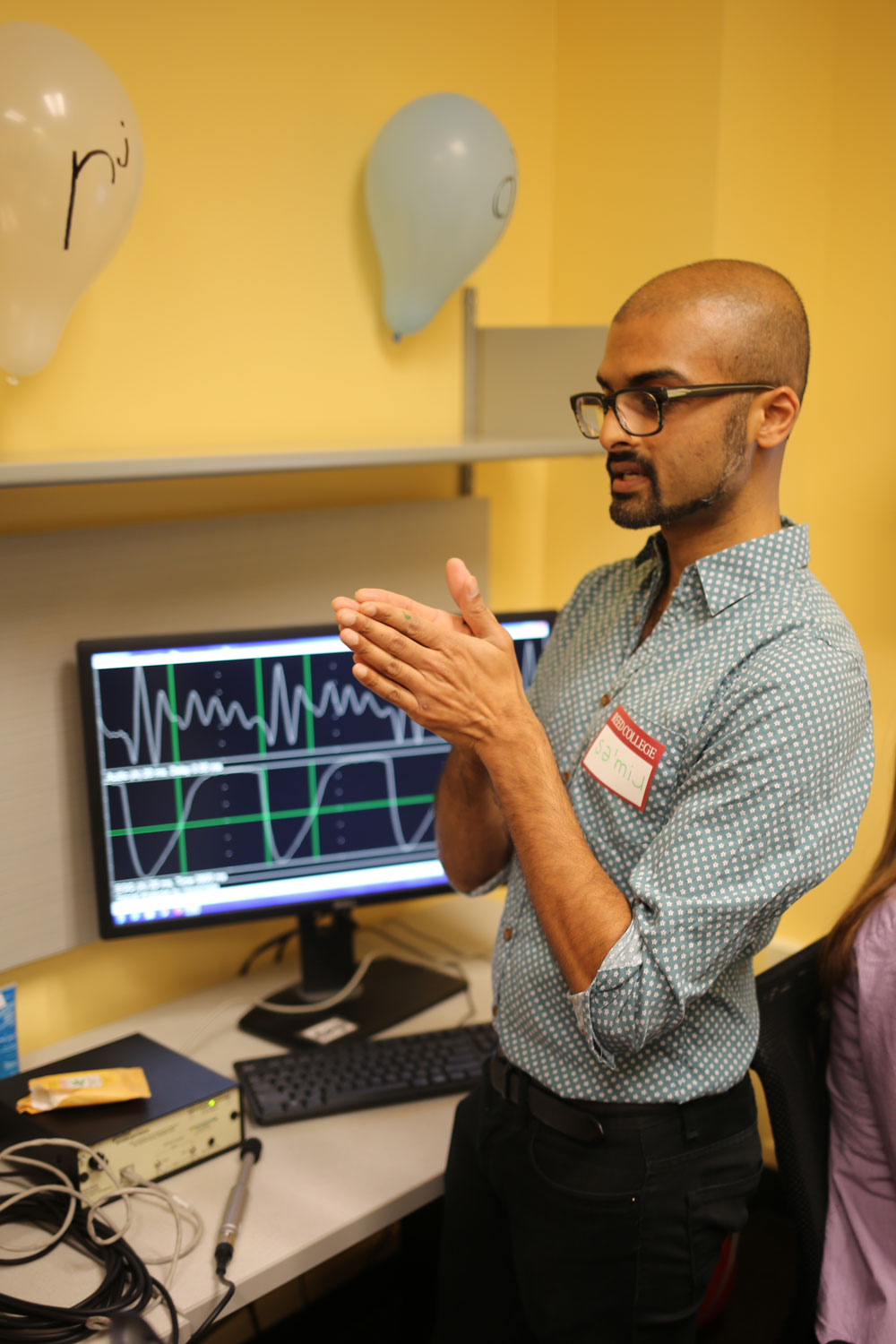
IRIS login | Reed College home Volume 96, No. 2: June 2017
Reed Launches Lab of Linguistics [LoL]

Prof. Sameer Khan [linguistics 2012–] demonstrates acoustical software at Reed's new Lab of Linguistics.
Say the following sentence out loud: “The cops caught the robber as he was sleeping on a small cot.”
Was there any difference in the way you pronounced the words caught and cot?
In some parts of the United States, such as New York City, speakers tend to distinguish the two. But in Boston and on the West Coast, speakers tend to pronounce them the same—a trend known to linguists as the low-back merger. Over centuries, the merger or migration of sounds can radically transform a language, as in the case of the Great Vowel Shift that rewired English in the Middle Ages.
Prof. Kara Becker [linguistics 2010–], an expert on accents and dialects, demonstrated the low-back merger and other sociolinguistic phenomena this week at an open house for Reed’s brand new Lab of Linguistics (LoL), which offers students better tools to study spoken language and gain insight into culture, society, and the structure of the human mind.
“In dialectology, we’re interested in how speakers differentiate themselves regionally,” she explained. “We want to document the changes that are going on because regional differences on how language changes over time is a really important thing to be aware of and be able to explain.”
Prof. Matt Pearson ’92 [linguistics 2001–] pointed out that most linguists now believe that to some extent humans are genetically hardwired to acquire language. “Patterns have evolved in the species in a way that is similar to other kinds of developmental processes, like learning how to walk,” he said. “At a certain point in your development, you just sort of pick it up. We think that acquiring languages is similar to that. We study that indirectly by looking at the kind of language and patterns that they produce in their speech.”
If linguists can discover ways in which all of the world’s languages conform to particular patterns, it may suggest those patterns are hardwired into our brains.
Located in Eliot 101D, the Lab of Linguistics will facilitate research by faculty and students. At least half of the senior linguistics majors will use the lab to make recordings, conduct interviews, and do experiments for their theses.
Many people believe that regional dialects are disappearing, but according to senior Shiloh Guten-Gale ’15, that is a myth.
“Across North America, dialects are actually differentiating,” she said.
Dialects may be differentiating, but according to Prof. Pearson, half of the four to six thousand languages spoken in the world today will cease to be spoken by the end of the century.
“When it comes to human languages we’re facing a period of tremendous extinction,” Pearson said. “One of the major tasks of linguists is to record as much data as possible on many different languages before they die out, so that we get a better sense of the diversity of human linguistic possibilities.”
At the open house, Prof. Sameer Khan [linguistics 2012–] and lab manager Yevgeniy Melguy ’15 demonstrated using an electroglottograph to obtain voice readings that show when the vocal folds are opening and closing.
“We’re involved in a research project where we look at how people use a creaky voice when they speak,” Prof. Khan explained. “A lot of people use it in their normal speech, some people use it just at the ends of sentences or when they’re in certain kinds of modes, like when they’re being relaxed and cool. We’re monitoring exactly when people do it, and if there are certain social factors that determine when they do it.”
Both informative and fun, the LOL open house demonstrated that laughter sounds pretty much the same in every language.
Tags: linguistics, great vowel shift


LATEST COMMENTS
steve-jobs-1976 I knew Steve Jobs when he was on the second floor of Quincy. (Fall...
Utnapishtim - 2 weeks ago
Prof. Mason Drukman [political science 1964–70] This is gold, pure gold. God bless, Prof. Drukman.
puredog - 1 month ago
virginia-davis-1965 Such a good friend & compatriot in the day of Satyricon...
czarchasm - 4 months ago
John Peara Baba 1990 John died of a broken heart from losing his mom and then his...
kodachrome - 7 months ago
Carol Sawyer 1962 Who wrote this obit? I'm writing something about Carol Sawyer...
MsLaurie Pepper - 8 months ago
William W. Wissman MAT 1969 ...and THREE sisters. Sabra, the oldest, Mary, the middle, and...
riclf - 10 months ago